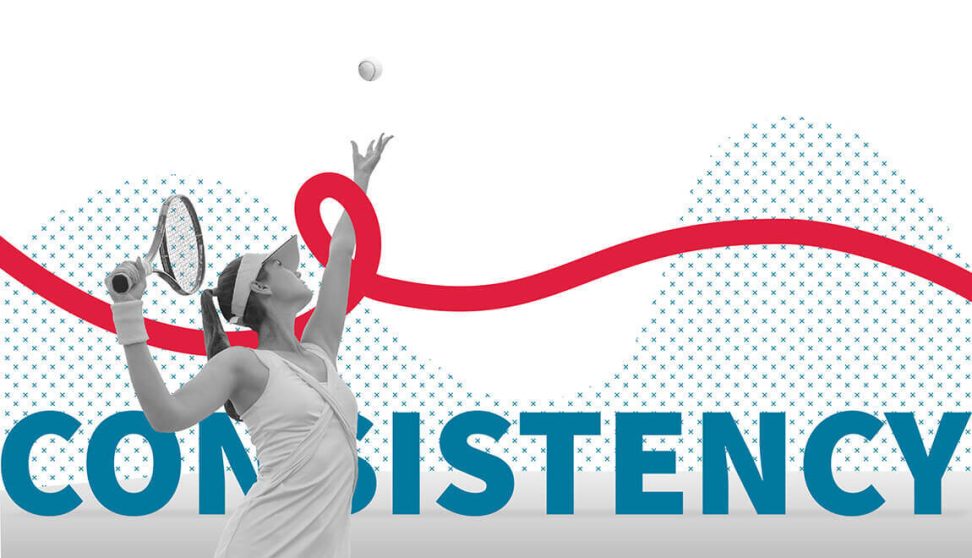How to Be Consistent: 6 Essential Tips

Consistency is the key to success, whether professional or personal. Yet, knowing something in theory and succeeding at it in practice is very different. When our daily lives are filled with distractions and different priorities, it can be difficult to stay on top of things and remain consistent.
Problematic – yes, but impossible – no.
6 Tips to Become More Consistent
1. Set Your Goals
In order to become more consistent, you have to set clear goals that you want to work towards.
You can start by listing all of them in a notebook or a piece of paper. Then, evaluate those goals and try to formulate a plan on how best to achieve them. If this doesn’t help, you can try one of the various goal-setting methods and techniques out there.
For example, you can try the SMART method for setting goals – commonly used for personal development and business and project management. With this method, you can set clear goals and increase the likelihood of successfully achieving them.
To start using the SMART technique, you should:
- Specific – Set a specific goal that is both well-defined and focused.
- Measurable – Make sure that the goal you set can be measurable. Meaning that it includes certain criteria that will allow you to track progress.
- Achievable – You have to ensure that the goal you’ve set out to accomplish is actually achievable. Consider all of your resources, skills, and limitations. Don’t sell yourself short, but also don’t veer away from reality.
- Relevant – The goal you are trying to accomplish should be meaningful, relevant, and aligned with your core values and objectives.
- Time-bound – To push yourself to become more consistent, set a specific deadline for completing said goal. This will create a sense of urgency and will help you stay on track.
2. Learn How to Prioritize
Sometimes, the thing that keeps us from being consistent is our inability to prioritize. When you’re dealing with multiple tasks, work, or personal obligations at the same time, all vying for your attention, you might find it hard to be consistent.
Learning how to prioritize can help you set your mind right, make it easier to deal with multiple things at once, and ultimately become more consistent.
There are a lot of different ways and methods for prioritization. You can start with a simple to-do list, where you write down all of your tasks and obligations and start ticking them off one by one. It's also very useful to have a not-to-do list.
If that doesn’t work, you can try one of the many prioritization techniques until you find the one that suits your particular needs and wants. For example, you can go with the Eisenhower method (created by US President Dwight D. Eisenhower). To start with, you should arrange all of your tasks into four separate categories based on their importance and urgency:
- Category 1 – Urgent and important tasks. You should do these straight away.
- Category 2 – Not urgent but important tasks. You should schedule these for a later date.
- Category 3 – Urgent but not important tasks. Try to delegate these.
- Category 4 – Not urgent and not important tasks. Don’t bother doing these. Either eliminate them or postpone them indefinitely.
Another commonly used method for prioritizing that you could try is called the ABCDE technique. Here’s how it works:
- Make a list of all of your tasks;
- Set letters to each of your tasks in the order of priority (A is the highest, B is an average priority, C is low, and so on);
- Start working on your tasks based on the letter grades you’ve assigned (first deal with the A’s, then the B’s, and so forth).
3. Always Record Your Progress
Another vital part of learning how to be consistent is to actively record your progress (on your tasks, goals, obligations, etc.).
You can go with the low-tech method and simply keep a journal of your progress. If that is not up your alley, you could try out more modern solutions like an easy-to-use spreadsheet or a digital app.
4. Limit Distractions
Distractions, especially if they happen a lot, can significantly stifle your journey to becoming more consistent. That’s why it’s important to actively work on eliminating or limiting distractions. Here’s how you can do that:
- Have a dedicated workspace;
- Turn off your phone while working or turn off notifications;
- Limit the amount of time you spend browsing the web or social media sites;
- Try out apps or different digital tools that can help you stay engaged more constantly;
- Try time-management techniques;
- Create a routine and stick to it.
5. Track Time
A big part of being consistent revolves around knowing where and how you spend your time. And, in the context of work, that means tracking the duration of individual tasks. There are several ways to do this:
- The pen and paper method – track time manually and record the results on a piece of paper;
- Using a regular spreadsheet – track time manually and note the results in a spreadsheet;
- Using a regular timesheet – track time manually and write down the results in a timesheet (digital or paper);
- Use project time tracking – allow a digital tool to automatically track the time for you and get 100% accurate results. You can find software with automated features for generating timesheets or spreadsheets;
After you’ve collected the information about how long it takes you to complete tasks, you can evaluate it to figure out what’s stopping you from being consistent. Try to find answers to questions like:
- Why does this particular task take x amount of time to finish?
- Can some tasks be done faster?
- Are there tools that I can use to streamline the process of completing certain tasks?
- Is my consistency dropping because of task difficulty?
- Can I improve work consistency by enhancing my skills and making particular groups of tasks easier to perform?
6. Be Patient and Forgive Failures
Once you start your journey to become more consistent, you will inevitably encounter failure. It could manifest itself in the form of not meeting the deadlines you set for yourself, or it could end up with you completely failing to meet the mark.
In either case, it’s important not to give up, but to give yourself enough time to work on another solution, forgive yourself, be patient, and change your mindset about failure.
Instead of fearing the negative outcomes, focus on growth and reframe failure as an opportunity to improve. As Carol Dweck, a famous psychologist writes in her book “Mindset: The New Psychology of Success”:
“In the fixed mindset, everything is about the outcome. If you fail—or if you’re not the best—it’s all been wasted. The growth mindset allows people to value what they’re doing regardless of the outcome.





